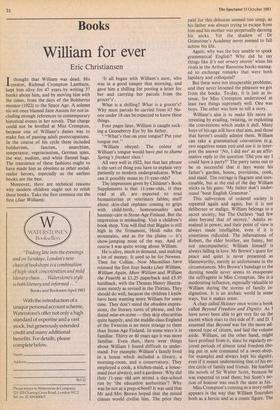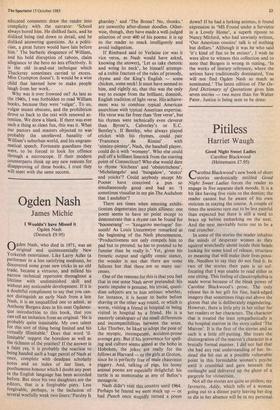Books
William for ever
Eric Christiansen
T thought that William was dead. His 1 creator, Richmal Crompton Lamburn, kept him alive for 47 years by writing 37 books about him, and by moving him with the times, from the days of the Bolshevist menace (1922) to the Space Age. A solemn nit-wit once blamed Jane Austen for not in- cluding enough references to contemporary historical events in her novels. That charge could not be levelled at Miss Crompton, because one of William's duties was to make fun of passing adult preoccupations. In the course of his cycle these included
bolshevism, fascism, anarchism, temperance, vegetarianism, German spies, the war, nudism, and white flannel bags. The transience of these fashions ought to have made him as obsolete as other social- realist heroes, especially as the earliest books are the best.
Moreover, there are technical reasons why modern children ought not to relish these books. Take the first sentence out the first (Just William):
'It all began with William's aunt, who was in a good temper that morning, and gave him a shilling for posting a letter for her and carrying her parcels from the grocer' s' .
What is a shilling? What is a grocer's? Why must parcels be carried from it? No- one under 18 can be expected to know these things.
Four pages later, William is caught suck- ing a Gooseberry Eye by his father.
"What's that on your tongue? Put your tongue out."
'William obeyed. The colour of William's tongue would have put to shame Spring's freshest tints.'
All very well in 1922, but that last phrase is the sort of thing you have to explain very patiently to modern undergraduates. What can it possibly mean to 11-year-olds?
The impression given by Children's Book Supplements is that 11-year-olds, if they read at all, are expected to read humanitarian or veterinary fables; stuff about skin-clad orphans coming to grips with child-birth, homosexuality and hamster-care in Stone-Age Finland. But the impression is misleading. Visit a children's book shop. You will find that Biggles is still high in the firmament, Heidi rules the mountains, and as for the plains — it's show-jumping most of the way. And of course I was quite wrong about William.
He is alive, much in demand, and making a lot of money. It used to be for Newnes.
Then for Collins. Now Macmillan have
reissued the first four books (Just William, William Again, More William and William the Fourth) at £1.25 paperback and £5.95
hardback, with the Thomas Henry illustra- tions mostly as revised in the Thirties. They should do well, because the children I know have been wanting more William for some time. They don't mind the obsolete expres- sions, the literary turns of phrase, and the
dated misv-en-scene — they skip obscurities quite happily, and the middle-class England
of the Twenties is no more strange to them than Stone-Age Finland. In some ways it is familiar. Thirty or 40 years ago it was more familiar. Even then, there were things about William I found difficult to under- stand. For example: William's family lived in a house which included a library, a morning-room, and a conservatory. They employed a cook, a kitchen-maid, a house- maid (not always), and a gardener. Why did their 11-year old son attend a day-school run by 'the education authorities'? Why was he not at a prep-school? It was said that Mr and Mrs Brown hoped that the mixed classes would civilise him. The price they paid for this delusion seemed too steep, as his father was always trying to escape from him and his mother was perpetually darning his socks. Yet the shadow of Dr Grimstone's Academy never seemed to fall across his life.
Again, why was the boy unable to speak grammatical English? Why did he say things like It's not ornery snorin' when his rivals in the Arthur Ransome books manag- ed to exchange remarks that were both lapidary and colloquial?
But these were not insuperable problems, and they never lessened the pleasure we got from the books. To-day, it is just as in- tense, for Miss Crompton understood at least two things supremely well. One was boys. The other was how to tell a story.
William's aim is to make life more in- teresting by evading, twisting, or exploiting the conventions which make it dull. Many boys of his age still have that aim, and those that haven't usually admire them. William can take a grammatical convention (e.g. two negatives mean yes) and use it to inter- pret the answer 'No, I did not' as an affir- mative reply to the question 'Did you say I could have a party?' The party turns out to be so successful that it lays waste his father's garden, house, provisions, cook, and maid. The outrage is flagrant and inex- cusable, but at the end of the day William sticks to his guns: 'My father don't under- stand 'bout English Grammar.'
This subversion of ordered society is repeated again and again, but it is not deliberate or malign. William belongs to a secret society, but The Outlaws 'had few aims beyond that of secrecy.' Adults re- mained in power, and their point of view is always made intelligible, even if it is sometimes ridiculed. The infatuations of Robert, the elder brother, are funny, but not unsympathetic; William himself is always falling in love. Mr Brown's quest for peace and quiet is never presented as blameworthy, merely as unfortunate in the circumstances. Mrs Brown's bondage to the darning needle never seems to exasperate the suffragette in Miss Crompton. She is a moderating influence, especially valuable to • William during the storms of family in- dignation. It is an archaic world in some ways, but it makes sense.
A chap called Skinner once wrote a book called Beyond Freedom and Dignity. As I have never been able to get very far on the ascent which rises to this side of F. and D. I assumed that Beyond was for the more ad- vanced type of citizen, and laid the volume aside. William, on the other hand, might have profited from it, since he regularly en- joyed periods of almost total freedom (be- ing put in sole command of a sweet-shop, for example) and always kept his dignity, even if it meant undermining that of his en- tire circle of family and friends. He loathed the novels of Sir Walter Scott, because he was expected to read them; but Scott's no- tion of honour was much the same as his.
Miss Crompton's cunning as a story-teller appears in the way that William flourishes both as a heroic and as a comic figure. The
educated comments draw the reader into complicity with the narrator: 'School always bored him. He disliked facts, and he disliked being tied down to detail, and he disliked answering questions. As a politi- cian, a great future would have lain before him.' The barbaric eloquence of William, and his bold disruption of taboos, claim allegiance to the hero no less effectively. It is the old in-and-out technique which Thackeray sometimes carried to excess. Miss Crompton doesn't. It would be a wise child that learned how to make people laugh from her work.
Why was it ever frowned on? As late as the 1940s, I was forbidden to read William books, because they were 'vulgar'. To us, vulgar meant obscene, and the prohibition drove us back to the text with renewed at- tention. We drew a blank. If there was ever such a thing as clean fun, this was it. What our pastors and masters objected to was Probably the unrelieved banality of William's suburban world, and his ungram- matical speech. Fortunate guardians they were, to be forced to look for offence through a microscope. If their modern counterparts think up any new reasons for disapproving of these books, I trust they will meet with the same success.











































 Previous page
Previous page